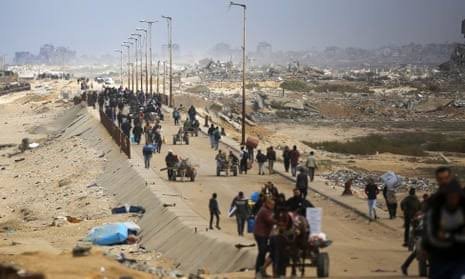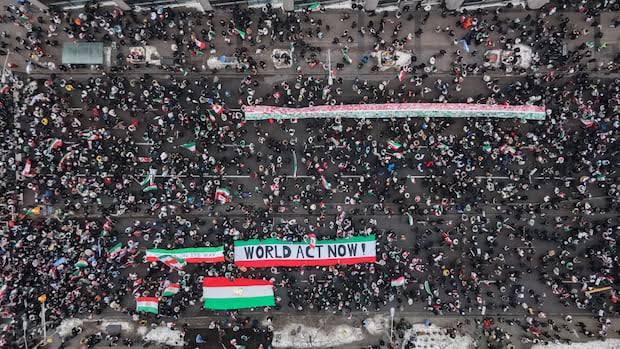Photo credit: the Guardian
US President Donald Trump’s idea to take over Gaza territory and his claims Palestinians were keen to move were met with anger and a determination to stay.
The Guardian reports that the proposal has been met with anger and disbelief by Palestinians sheltering in the ruins of their homes or crammed into makeshift camps.
Trump had suggested Palestinians were keen to leave a place he described as “unlucky” and a “symbol of death and destruction”. It was a vision of Gaza formed without consulting the people who live there.
Even before the war, life in Gaza was difficult, with an economy stilled by an Israeli blockade, political repression under Hamas’ hardline rule, and overcrowding in one of the most densely populated places on Earth.
However, residents were proud of a history stretching back millennia, their spirit of optimism even in challenging times, and their commitment to education at more than a dozen universities and higher education institutes. They loved the beaches that caught Trump’s eye such as Gaza’s sunny climate, and enjoyed relaxing in its orchards, restaurants, and cafes.
Abu Firas is a 52-year-old Palestinian who lives in a tent on the coast. His home in eastern Khan Younis has been destroyed, and he lost 80 relatives. He wants help to rebuild rather than a ticket out of his loved place. He said, “No amount of money in the world can replace your homeland.”
Thousands trekked back to homes in the north last week after Israel lifted controls on movements across the strip. It was a case of mixed feelings as many wept with joy when they arrived while they found only piles of rubble.
Ramz, a 50-year-old father of four said: “No matter where a person moves or how much they try to live in beautiful cities, they will never find peace except in their own city and land.
“In the end, despite all this destruction, we will stay here on our land to live and die with dignity.”
In Gaza, people’s affection for their land is often reinforced by a political commitment to staying on land envisaged as part of a Palestinian state.
While Trump’s proposal for a Gaza without Palestinians is not a novel one, it has never been made by a US president. For decades, Israeli politicians and officials have debated expelling Gaza’s residents by force or using economic incentives to encourage mass migration.
Walid al-Munayya, who was displaced six times in the war, said: “We have a famous saying: ‘He who leaves his home, loses his dignity’. We are a resilient people, and this will not happen, even in Trump’s dreams. we will stay here and not give up an inch of our land.”
Many families moved to Gaza as refugees in the Nakba, or catastrophe, of 1948, in which about 700,000 Palestinians were expelled after the creation of Israel. That history means many are sceptical of any displacement.
During the war in Gaza, many feared that Israel’s repeated orders for civilians to leave the north of the strip could be a prelude to settling or annexing the land.
Those who stayed on were either too sick or disabled to travel while others were determined to stay on their land, even as a blockade within a blockade reduced food supplies more than in the south.
The survival of Hamas as a fighting force, despite the Israeli military’s scorched earth tactics, should also serve as a warning to Trump if he is serious about sending in US troops. Firas said, “(Israel) bombed Gaza with all kinds of bombs and missiles. despite all this, they couldn’t control Gaza. So how can they force us to leave?
“What more can they do to us?”







